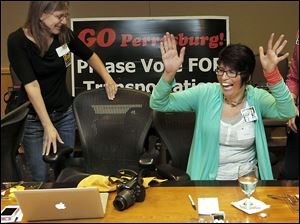
Half-stepping
Perrysburg inched forward on transit this week — but not enough to meet the needs of city businesses or residents
5/9/2013
Two Perrysburg 4 Transit committee members celebrate the passage of the city's transportation levy this week.
In overwhelmingly approving a 0.8-mill property tax levy this week, Perrysburg voters took a half step forward on public transit. That’s progress, given how Perrysburg’s leaders have bungled the transit issue over the past year. But it’s not enough to serve the needs of the city’s economy or residents.
The five-year levy, passed with almost 72 percent of the vote, will generate $450,000 a year, costing the owner of a $200,000 house about $50. It will fund a bare-bones shuttle program that should enable the city to avoid a federal civil-rights lawsuit by providing basic local service for people with disabilities.
Even so, the new contract will not provide the regional connections that Perrysburg residents, employees, and employers need. No local shuttle service can replace the nearly 67,000 annual boardings, including more than 6,000 paratransit users, that the Toledo Area Regional Transit Authority previously handled in Perrysburg. The TARTA tax generated nearly $1.4 million a year.
TARTA service, funded by a 2.5-mill tax, ended in Perrysburg last September, after voters withdrew from TARTA in March, 2012. Workers outside Perrysburg, including those in Toledo, could no longer get to workplaces there.
TARTA now serves eight communities and carries more than 3 million riders a year. By leaving TARTA, Perrysburg isolated itself, socially and economically, from the metropolitan region. It undermined northwest Ohio’s regional transit system and possibly hurt other efforts to cooperate and collaborate.
After TARTA service ended, Perrysburg contracted with a Missouri company called Ride Right for interim call-a-ride service. Public transit in Perrysburg ended entirely last November, after voters defeated a stripped-down 1.45-mill transit levy that would have provided limited service for disabled people.
Members of the Perrysburg City Council then put a minuscule service plan on the May 7 ballot — the 0.8-mill transit levy voters approved this week. Ride Right will again provide the service, which should start operating in 60 days.
It is encouraging that this week’s election galvanized local transit advocates in Perrysburg, who championed the levy through a campaign drive, Go Perrysburg. Advocates should stay organized and continue to push for better mass transit in Perrysburg, including an effort to rejoin TARTA — northwest Ohio’s only regional system.
Political leadership must step up too. TARTA, by law, cannot lobby or solicit new member communities, but elected officials can. Local economies are regional in scale, and northwest Ohio will rise or fall together. Whether a community drops out of TARTA or stays — or whether new members join — affects every municipality in the region.
A recent Brookings Institution report ranked metro Toledo among the worst major U.S. metropolitan areas for its share of jobs in neighborhoods served by public transit. In suburban Toledo, only one-third of jobs are transit accessible, depriving businesses of potential workers. Nearly 14 percent of Toledo households don’t have vehicles.
TARTA’s ridership grew last year — to 3.42 million from 3.36 million — despite losing Perrysburg, said the authority’s marketing director, Steve Atkinson.
Northwest Ohio needs a transit champion. The mayor of Toledo, the region’s largest city, is the logical choice. If he’s not up to the job, someone else should step forward. The Toledo Metropolitan Area Council of Governments ought to get more involved too.
TARTA should serve the entire region, and the location and density of Oregon and Springfield Township make them logical candidates to join the system. Even in southeast Michigan, arguably the most divided and dysfunctional metropolitan region in the nation, elected leaders are talking about moving forward on regional mass transit.
If southeast Michigan can do it, so can northwest Ohio. Perrysburg’s half step is only a start.